Bananas with small blemishes? They are usually not for sale in supermarkets. Unopened yoghurt cups at the hospital bed? Walk straight into the trash after clearing. Quark with an expired best-before date? Come away, better safe than sorry. 1.1 million tons of food are thrown away in Germany every year, a good part of which would be edible without any restrictions. The federal government now wants to curb this prosperity problem, together with large food chains.
On Tuesday, Federal Food Minister Cem Özdemir (Greens) signed an agreement with the Federal Association of the German Food Trade and 14 wholesale and retail companies that is intended to curb waste and poor planning in food marketing. In a joint “Pact Against Food Waste”, which was presented in Berlin, companies such as Aldi, Edeka, Metro and Penny pledge to reduce their food waste, give away more leftovers and optimize supply chains – and also have this checked.
Cem Özdemir is Federal Minister of Food and Agriculture.
(Photo: Britta Pedersen/dpa)
The agreement stipulates that food waste in discounters and retailers will be reduced by 30 percent by 2025 and halved by 2030. This step is not a German invention. Özdemir, together with large food chains, is only implementing what the United Nations have long since established with the Agenda 2030 “Sustainable Consumption and Sustainable Production”: that hopeless waste in industrialized countries and hunger in the world must be combated more resolutely, also by reducing waste along the supply chain.
“Clear and binding rules have been agreed”
“Our pact is based on a voluntary basis, but is anything but a loose agreement,” said Federal Food Minister Özdemir on Tuesday. “Clear and binding rules have been agreed” that are also “reviewed and to which the companies are publicly accountable”. The focus is on “togetherness”. Özdemir presented the agreement just in time for the international conference “Politics against Hunger”, which took place in Berlin on Tuesday.
The agreement, which is to apply until the end of 2031, obliges the signatory food companies to pass on surplus and still edible goods, at least part of it, with immediate effect. Many supermarkets are already voluntarily donating leftover heads of lettuce or bread with an expired best-before date to charitable institutions. The key issues paper of the agreement states that the transfer should now become mandatory and every company should demonstrate “at least one permanent cooperation with a corresponding recipient organization”: “Eatable food should primarily be donated to social institutions such as the food banks.” Rejected or withered items can also be given to intermediary platforms “or to the company’s own employees”.
In the self-commitment, it was also agreed that food “should not be made unusable for consumption through active action” – a regulation that also applies in France to prevent waste. What is not suitable for human consumption should be put to the best possible use or processed into animal feed. But the food chains also vow to tackle their own mismanagement more consistently.
Because it is not uncommon for excessive shopping to result in oversupply in shops – and in the bin. “Specific measures regarding excess quantities and returns” have now been agreed, as well as more training for employees and the optimization of logistics and cold chains. The Thünen Institute for Market Analysis is to check whether the intentions are actually implemented. The Federal Research Institute for Rural Areas, Agriculture, Forestry and Fisheries is to present an “annual public report” that makes transparent which companies have met their obligations – and which have not.
Liability and tax law measures to combat food waste could not be agreed. Özdemir wants to continue talking about this with the federal states and Justice Minister Marco Buschmann (FDP). There are also plans to increase “consumer awareness”. Because in retail, only seven percent of food is thrown away. 15 percent is generated during processing, 17 percent in canteens and out-of-home catering. The main squanderers of good food are consumers. Almost 60 percent of food waste in Germany comes from private kitchens.

